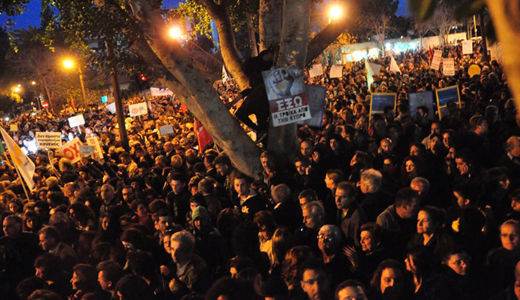
It has been well known for some time that the countries of the European south, Greece in particular, have suffered greatly due to the world crisis of capital. The crisis has now turned on the Mediterranean nation of Cyprus with a vengeance. The main Cypriot banks, Bank of Cyprus and the Laiki Bank, suffered massive losses due to their speculation in Greek bonds forcing Cyprus to turn to the stability mechanism of the European Union to bail out its banks.
The leading elements of the European Stability Mechanism (ESM), popularly known as the “Troika”, demanded, among other measures, a “haircut” of the deposits in Cypriot banks. The current president of Cyprus, Nicos Anastasiades had himself suggested that this “haircut” be applied to all deposits, something like 6.6 percent for deposits less then €100,000 and almost 10 percent for deposits of €100,000 and greater. This proposal meet with great popular opposition and was voted down of Tuesday March 19th with all of the Representatives from the DISY party, (the party of Anastasiades), abstaining.
Anastasiades, who was elected president of Cyprus in February, had, both before and shortly after the election, promised that there would be no such “haircut.” Thus his creditability has been severely damaged and many Cypriots are now blaming him for allowing this attack on the Cypriot economy.
Following the rejection of the original proposals Anastasiades and the “Troika” went back to the drawing board and came up with an alternative package that was approved on Friday March 22nd, over the objections of AKEL. What is now being called the Anatasiades-Eurogroup Agreement, limits the “haircut” to only those deposits over €100,000. These “haircuts” will be very severe, in certain cases as much as 80 percent, but the exact per-cent has not yet been clearly defined. The Laiki bank will be closed and deposits of €100,000 and greater will be frozen. Potential losses on such deposits may be as high as 80 percent. Those deposits below €100,000 will be transferred to the Bank of Cyprus. Deposits over €100,000 at the Bank of Cyprus will also be frozen and may be subjected to losses as high as 40 percent. An AKEL suggested amendment to protect deposits held by pension funds was rejected but an AKEL (i.e. communist party) proposed “Solidarity Fund,” intended to encourage popular investment in the nations energy sector, passed with the support of all parties. The banks are now scheduled to reopen on Thursday, March 28th.
Basically, the final agreement capitulates to demands articulated by the head of the International Monetary Fund, (the IMF, one of the constituents of the “Troika”), Christine Lagarde, among whose goals were to shrink the banking sector, cut the budget and privatize state assets measures which, for Cypriots will translate into job losses and benefit cuts. Indeed the closing of Laiki Bank alone will result in the direct loss of some 1,500 jobs, this in a country whose total population is 800,000 plus 200,000 immigrants.
In an official statement AKEL called the agreement the climax of the first phase of the “Troika’s” plans against the Cypriot people, and said that the agreement, which they called the results of blatant blackmail by the “Troika”, would lead to higher unemployment and the implementation of additional austerity measurers, including cuts and privatizations, and will cause huge problems, not only for the nation’s working people but also for small and medium businesses. In short the same measures that have led to disaster wherever they have been applied are now being forced on Cyprus. AKEL, which form the beginning of the crisis of capital struggled successfully to protect the people of Cyprus, is now calling on the government to seek a settlement of the fiscal crisis outside the framework of the “Troika”, which is threatening to stop all capital flows to the nations banks unless all that it demands is acceded to.
AKEL’s official statements seem to reflect the sentiment of the Cypriot masses since there have been daily demonstrations against what is widely perceived to be an EU sponsored plot against the nation. For instance on Tuesday March 26th young people marched through the streets carrying signs, which among other things, compared German chancellor Angela Merkel to Hitler and there seems to be generally agreement with AKEL’s estimation that the “Troika” and Germany are taking a neo-colonial approach to Cyprus and to the rest of Europe. AKEL itself has called for a popular demonstration on Wednesday March 27th.
Relative to most EU member nations the Cypriot economy is small but the prospect of similar bank “haircuts” has rippled through the Euro-zone, particularly the European south provoking widespread panic and indignation.
Photo: Demonstrators protest the Troika in Cyprus. Gary Bono/PW












Comments